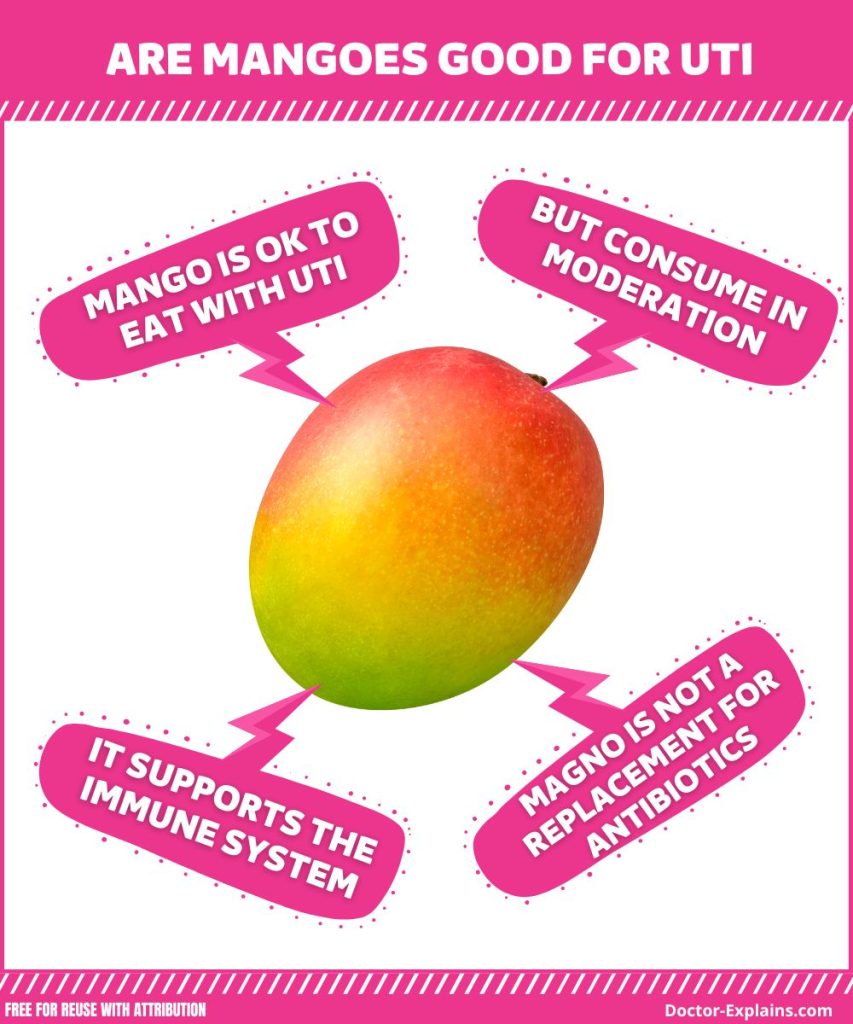Antibiotics are the go-to treatment for UTIs. However, many people are on the lookout for natural ways to prevent or handle these infections.
A question that is frequently asked by my patients is whether specific fruits, such as mangoes, are beneficial or detrimental for UTI patients.
In this comprehensive guide, I’ll take you into the advantages and potential disadvantages of consuming mangoes during a UTI and discuss some practical tips and alternative fruit options to help you make informed choices.
The short answer:
Mangoes are not harmful to UTI patients, providing vital nutrients and antioxidants that can support overall health. However, no scientific evidence is not a direct treatment for UTIs, and their role in preventing recurrent infections is not yet fully understood.
Key Facts:
- Mangoes are safe for UTI patients when you consume them in moderation.
- They offer essential nutrients and antioxidants (support the overall immunity).
- Mangoes are not a direct treatment for UTIs (An antibiotic is a must for UTIs).
- The role of mangoes in preventing recurrent UTIs is not fully understood
- Tips for eating mangoes with a UTI
- Alternative fruit options for UTI patients

Is Mango good for UTIs?
Mangoes are delicious and nutritious, brimming with vitamins, minerals, and antioxidants.
While they don’t directly treat UTIs, they provide some health benefits that can contribute to the overall well-being of those coping with these infections (reference).
Firstly, mangoes are an excellent source of vitamin C, an essential nutrient for supporting a robust immune system. A healthy immune system may help the body more effectively combat infections, including UTIs.
Secondly, mangoes are filled with antioxidants, including beta-carotene, which the body converts into vitamin A. Antioxidants are vital in fighting free radicals, which can cause cellular damage and increase the risk of infections (reference).
Lastly, mangoes boast a high water content, which can aid in staying hydrated. Proper hydration is crucial for flushing bacteria out of the urinary system and minimizing the risk of UTIs.
The table below illustrates the important component of mango and their benefit for UTI patients.
| Component | Benefit for UTI Patients |
|---|---|
| Vitamin C | Boosts the immune system, helping the body fight off infections |
| Vitamin A | Supports the immune system and maintains healthy mucous membranes in the urinary tract |
| Antioxidants | Fights free radicals, reducing cellular damage and the risk of infections |
| Beta-carotene | Converted into vitamin A in the body, providing antioxidant benefits |
| Dietary Fiber | Helps maintain a healthy digestive system, which can indirectly support the immune system |
| High Water Content | Aids in staying hydrated, helping to flush bacteria out of the urinary system |
Is Mango Bad (contraindicated) for UTI patients?
After reviewing the research and the major UTI guidelines, I found no evidence suggesting that mangoes are contraindicated or harmful for UTI patients.
So, you can safely consume mangoes during a UTI, and they will not exacerbate your symptoms.
However, always remember that mangoes are not a direct treatment for UTIs. Antibiotics prescribed by a healthcare professional are the most effective treatment for your UTI.
If you have any concerns about consuming mangoes or other fruits during a UTI, it’s always a good idea to consult your healthcare provider.
Does eating mango prevent recurrent UTIs?
Research is limited.
There is limited research on whether eating mangoes can prevent recurrent UTIs. While mangoes supply essential nutrients and promote overall health, they are not a guaranteed solution for preventing UTIs.
If you maintain a healthy lifestyle, practice good hygiene, and stay hydrated, your risk of UTI recurrence will dramatically decrease.
Mangoes support the immune system.
Eating a balanced diet, including a variety of fruits like mangoes, can contribute to overall wellness and may help support your body’s natural defenses against infections.
Moreover, mango polyphenols are a group of natural compounds found in mangoes, which include mangiferin, quercetin, gallic acid, and catechins. These compounds exhibit antioxidant, anti-inflammatory, and other potential health benefits (reference).
Tips for eating mango for UTI
If you’re considering incorporating mangoes into your diet while dealing with a UTI, keep these tips in mind:
- Wash your mangoes thoroughly: Before consuming any fruit, wash it properly to remove dirt, bacteria, and potential pesticide residues.
- Eat in moderation: While mangoes are healthy, they are also high in natural sugars. Consuming too much sugar can lead to imbalances in your gut flora, which may negatively affect your immune system. Enjoy mangoes in moderation as part of a balanced diet.
- Combine with other UTI-friendly foods: Pair your mango with other foods that support urinary tract health, like yogurt, which contains probiotics that can help maintain a healthy balance of bacteria in the body.
- Stay hydrated: Don’t forget to drink plenty of water, as proper hydration is essential for flushing out bacteria and reducing the risk of UTIs.
- Choose ripe mangoes: Ripe mangoes have a richer flavor and contain more nutrients than unripe ones. Look for mangoes with a slightly soft, yielding exterior and a fragrant aroma.
- Incorporate mangoes into various recipes: Get creative with how you consume mangoes. Add them to smoothies (or drink mango juice), salads, or desserts for a delicious and nutritious twist.
Other great fruit options for patients with recurrent UTIs
In addition to mangoes, several other fruits can be beneficial for individuals with recurrent UTIs:
- Cranberries: Cranberries contain proanthocyanidins, which can help prevent bacteria from adhering to the urinary tract. Drinking unsweetened cranberry juice or consuming cranberries in whole form may help reduce the risk of UTIs.
- Blueberries: Like cranberries, blueberries also contain proanthocyanidins, which can support urinary tract health. Enjoy them fresh, frozen, or as juice (reference).
- Watermelon: Watermelon is high in water content, which can help keep you hydrated and flush out bacteria from the urinary system.
My conclusions:
Mangoes are not harmful to UTI patients and offer essential nutrients and antioxidants that can support overall health.
However, it’s crucial to remember that mangoes are not a direct treatment for UTIs, and their benefits in preventing recurrent infections are not fully established.
Enjoy mangoes in moderation as part of a balanced diet, and consider incorporating other UTI-friendly fruits, like cranberries and blueberries, to support urinary tract health.
As always, consult your healthcare provider with any concerns, and remember that maintaining a healthy lifestyle, practicing good hygiene, and staying hydrated are key factors in reducing the risk of recurrent UTIs.






